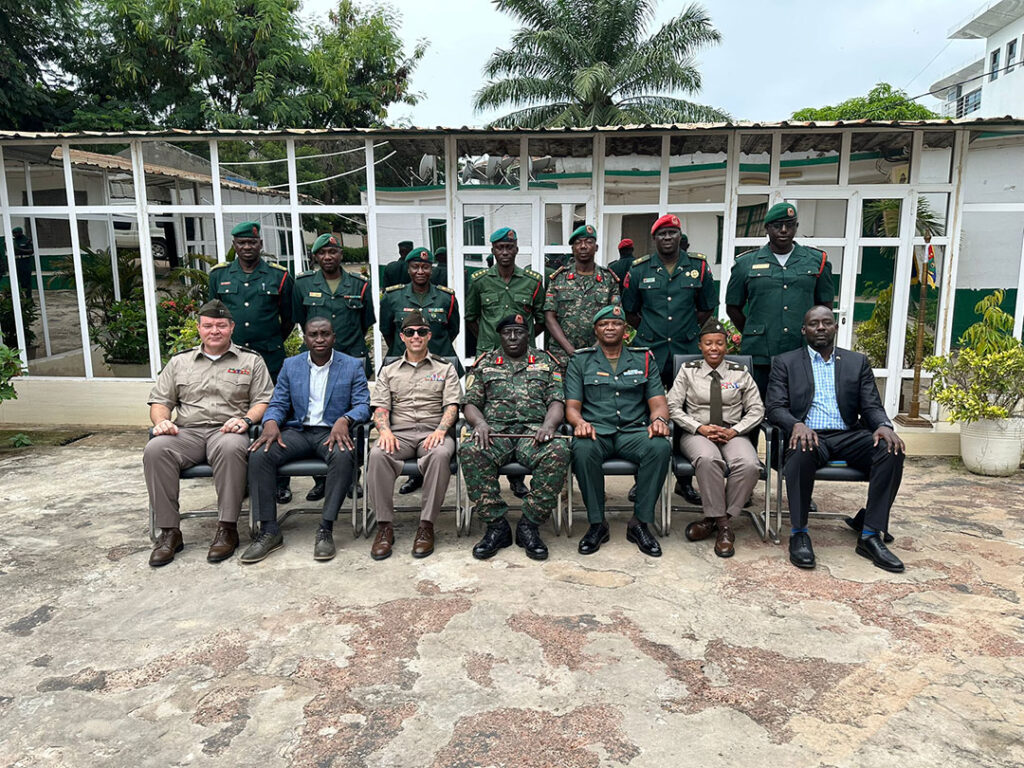ADF STAFF
Soldiers from The Gambia and the U.S. joined for a one-week event in August to share knowledge and best practices related to military professionalism and accountability.
Members of the Gambia Armed Forces (GAF) and the U.S. Army Southern European Task Force, Africa (SETAF-AF) attended the meeting in Banjul. It focused on topics including the inspector general (IG) system, the rule of law and improving military cooperation between the two nations.
“The opportunity to engage in dialogue with our Gambian counterparts was invaluable,” said Lt. Col. Benjamin Barrett, chief of engagements and exercises, SETAF-AF Inspector General office. “By exchanging insights on the IG system and rule of law, we can enhance our mutual understanding and strengthen the foundation of integrity and justice in both of our militaries.”
Used in the U.S. and many other countries, the IG sits within the military chain of command and reports to the service branch chief or another leader. Sometimes called the “eyes, ears, voice and conscience” of the commander, the IG serves as an internal oversight mechanism flagging problems or deficiencies in the military. When working effectively, the IG alerts commanders to issues so they can be addressed proactively.
The Gambia is working to improve military accountability and restore the image of its armed forces. In 2017, newly elected Gambian President Adama Barrow launched a security sector reform process aimed at improving the performance of the military and ending abuses stemming from 22 years of dictatorial rule. Reforms have included strengthening security sector oversight mechanisms and forming a Truth, Reconciliation and Reparation Commission to document past abuses.
Brig. Gen. Sait Njie, commander of the Gambia National Army, said much work is left to be done.
“As we have emerged from a political system in which some personnel of the Armed Forces soiled the good relationship we used to have with the civilian population, it is the desire of my command to engage in activities that seek to promote a culture of understanding and cooperation with all civil actors within our area of responsibility,” Njie said in March at a promotion ceremony for 312 Soldiers. “It is largely through this way that we can regain the confidence and respect of the Gambian people.”
The U.S.-Gambia meeting included case studies of challenging issues regarding the rule of law and military professionalism. It also led to candid conversations between Soldiers from the two nations.
“One of the key takeaways from this exchange is the shared commitment to accountability and integrity within our respective militaries,” Lt. Col. Reneka Redmond of the SETAF-AF Staff Judge Advocate office said. “It’s inspiring to see how our two countries, despite different histories and systems, are aligned in our dedication to upholding these values and the rule of law.”
In recent years, coups have multiplied in West Africa, and The Gambia put down an attempted coup in 2022. The country hopes it can strengthen civil-military relations and avoid falling into the coup trap by doubling down on its core values, including an apolitical posture and strict military subordination to civilian rule.
“Since the change of government, GAF has made significant strides to remove the military from politics and also remove politics from the military,” Njie said. “These gains must be strengthened because politics is beyond the scope of our competence and therefore involvement in it will only result in the erosion in military professionalism and loss of confidence and respect.”

